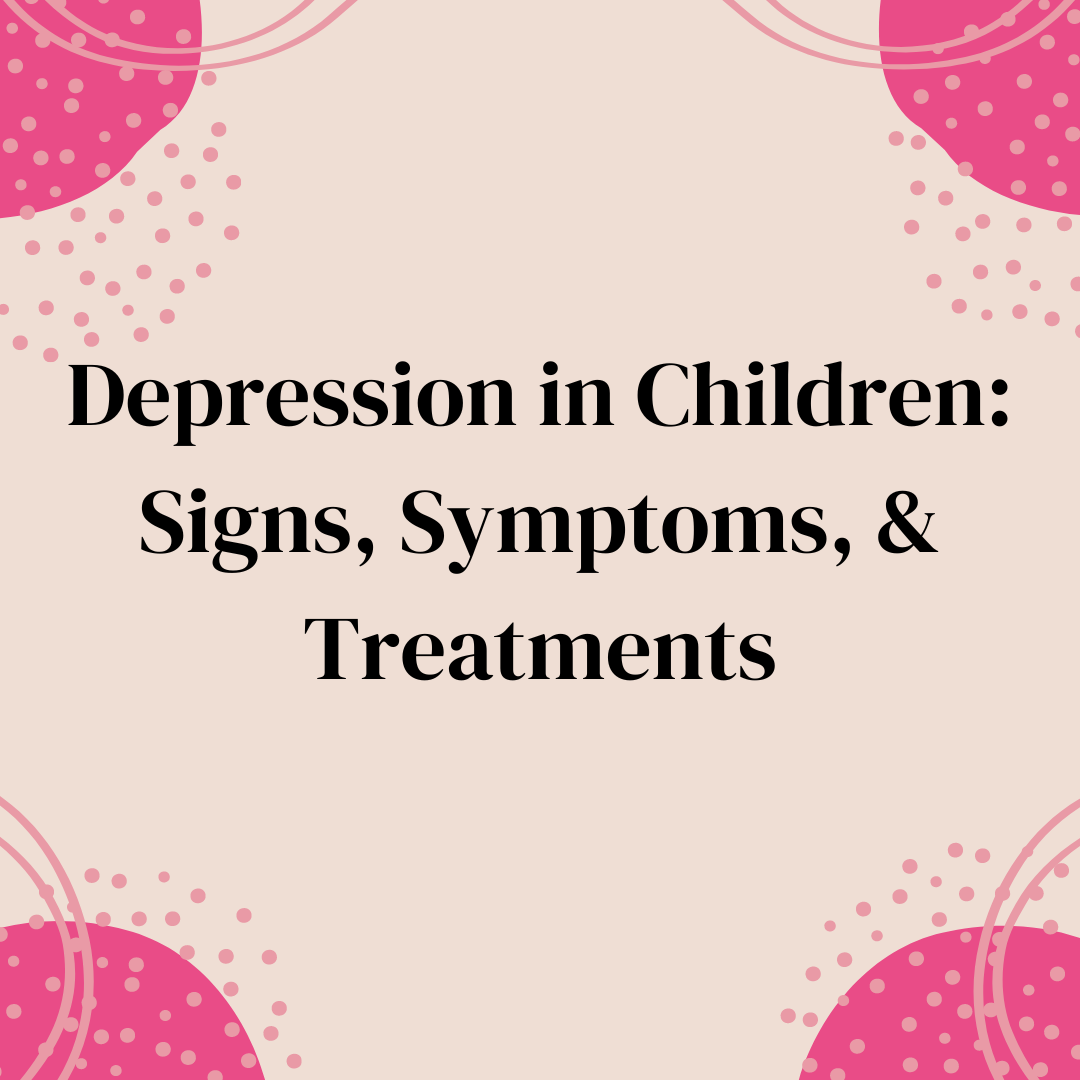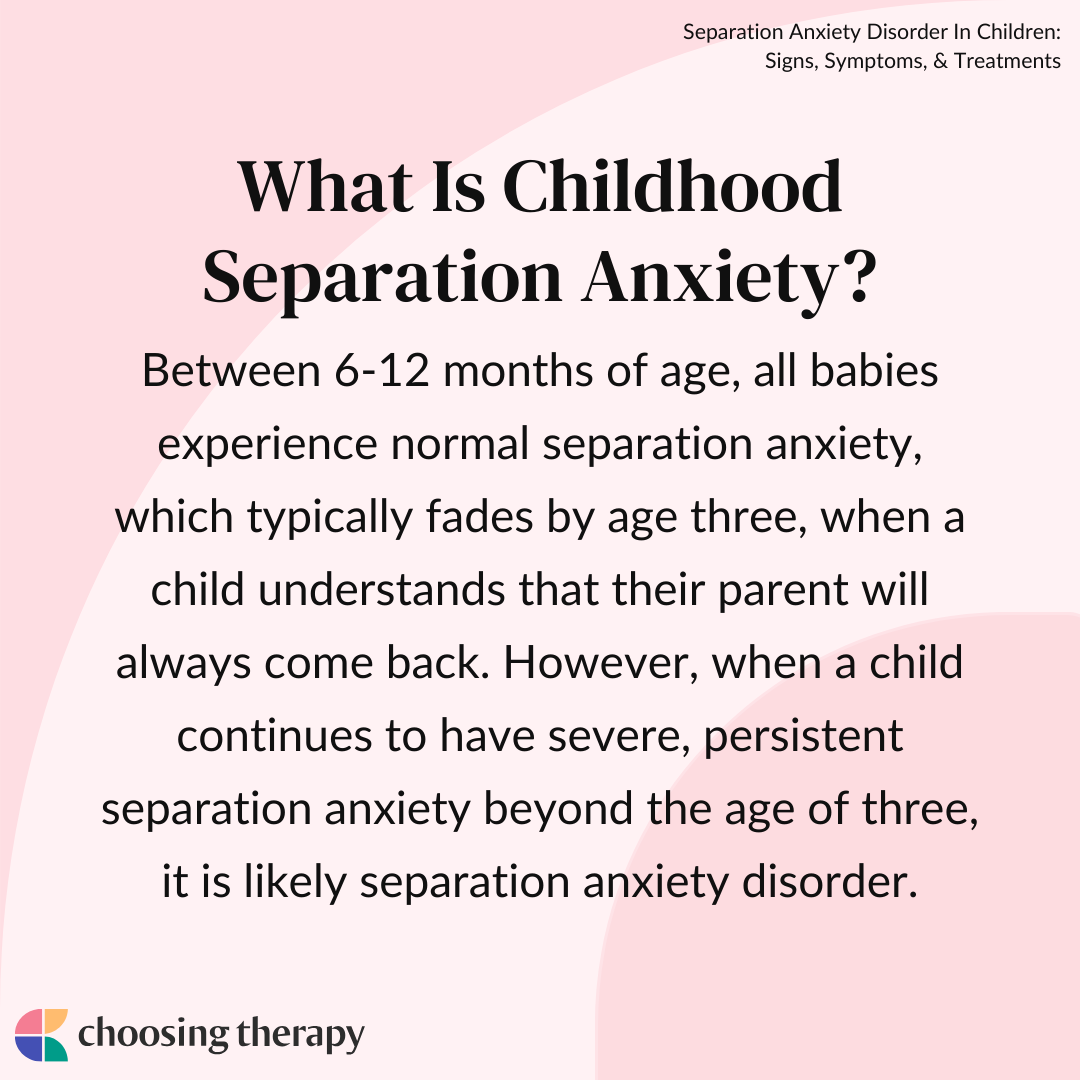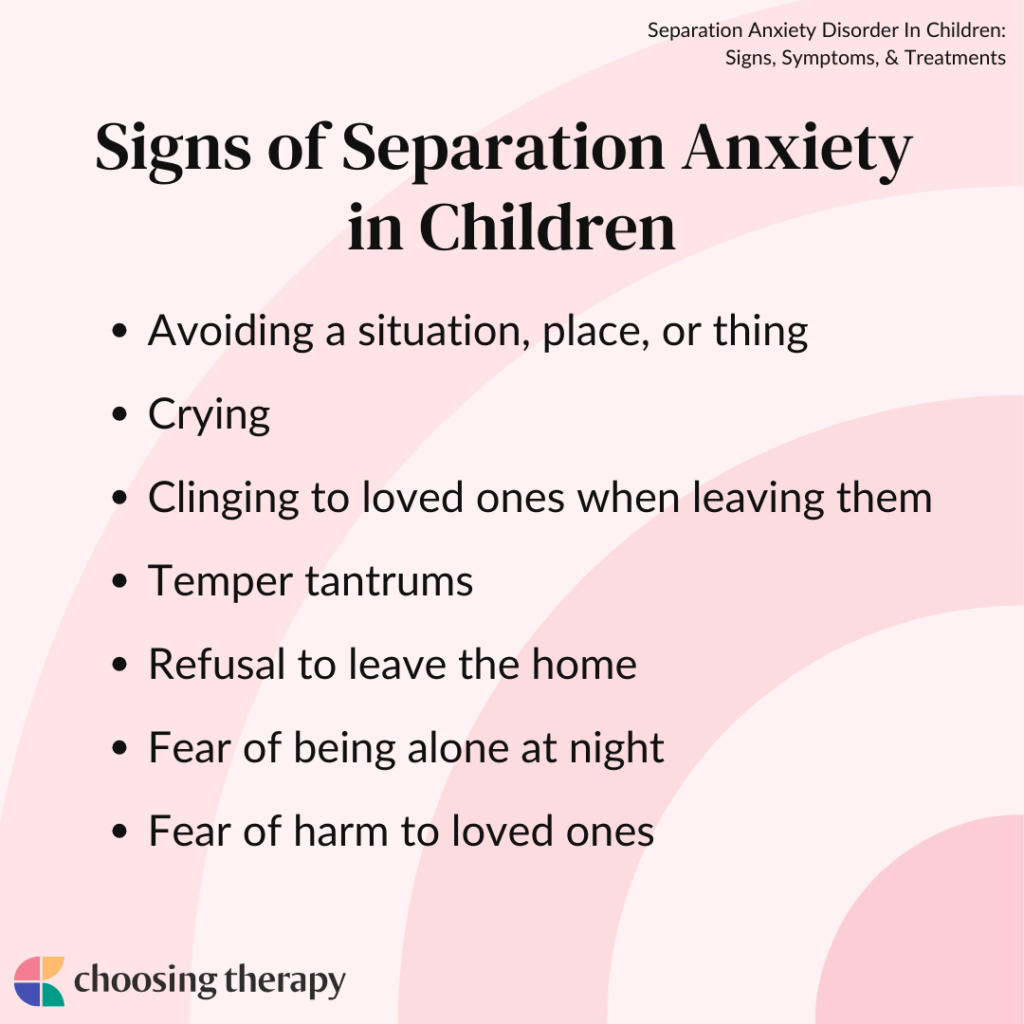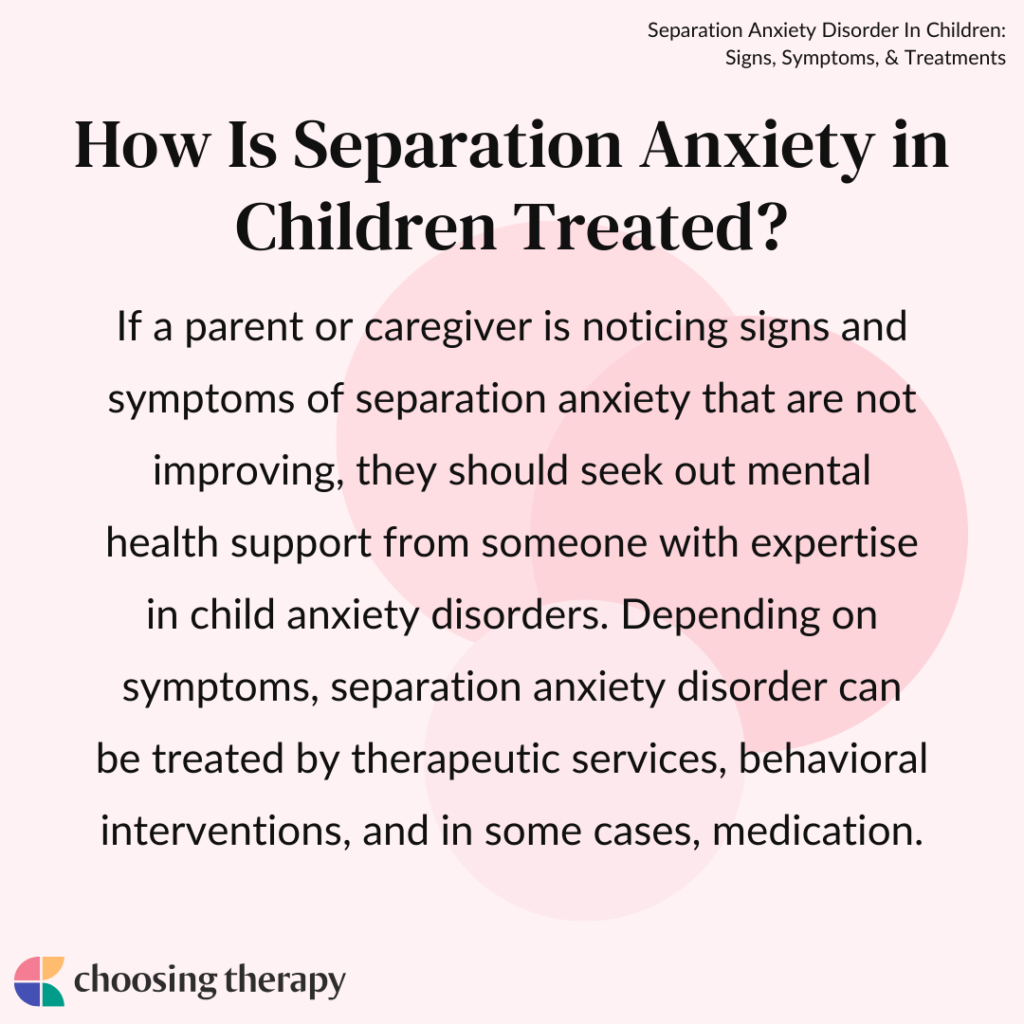Separation anxiety is very common in young children.1 One of the main symptoms is fear or nervousness associated with being separated from primary caregivers. Children with separation anxiety may display behavioral symptoms, but somatic symptoms like stomach aches, headaches, nausea, and sleep disturbances can occur as well.2
Are you obsessively asking yourself “Am I a good parent?” Most parents occasionally ask themselves the question. However, if you are constantly worried about being a good parent and cannot control your fears, you might have OCD. Learn More
What Is Childhood Separation Anxiety?
Between 6-12 months of age, all babies experience normal separation anxiety, which typically fades by age three, when a child understands that their parent will always come back. However, when a child continues to have severe, persistent separation anxiety beyond the age of three, it is likely separation anxiety.3
If a child regularly experiences distressing thoughts or feelings about being away from a parent, worries about losing a parent, refuses to be away from home, refuses to sleep away from home without a parent, or complains of frequent headaches, stomachaches, or other physical symptoms when separated from a parent, they are likely facing separation anxiety disorder.
How Common Is Separation Anxiety in Children?
Separation anxiety disorder is one of the most common childhood anxiety disorders. In children, it is estimated that separation anxiety disorder occurs at a rate of about 4.1%, and accounts for half of all anxiety-related mental health referrals in children. The average age of onset is about six-years-old, and about one-third of children diagnosed with it go on to struggle with separation anxiety into adulthood, if left untreated.4
Signs of Separation Anxiety in Children
Children exhibit symptoms of separation anxiety disorder through behavioral changes like clinginess, school absences, temper tantrums, crying, or changes in speech.5 They may also experience physical symptoms similar to adults with anxiety, including heart palpitations, sweaty palms, and irritability. Family members and school personnel are often the first to notice these signs of separation anxiety in children.
Here are signs a child may display if they’re experiencing separation anxiety:
- Avoiding a situation, place, or thing
- Crying
- Clinging to loved ones when leaving them
- Temper tantrums
- Refusal to leave the home
- Fear of being alone at night
- Fear of harm to loved ones
The signs of separation anxiety are subjective and can be difficult to observe. Therefore, it is important for parents, caregivers, and personnel in school settings to pay close attention to signs that may be abnormal behavior in children. Also, it is important to note that the signs of separation anxiety in children may look similar to other disorders in children.
Normal Separation Anxiety vs. Separation Anxiety Disorder
It’s perfectly normal for children who are leaving their primary caregivers for the first time to be anxious. Normal instances of separation anxiety often take place when children go to childcare or school for the first time. As determined by the DSM-V, children must experience a minimum of one month of symptoms to be diagnosed with separation anxiety disorder. The developmental level of the child must be taken into consideration as well.
Symptoms of Separation Anxiety In Children
Symptoms in children experiencing separation anxiety are subjective and can go unnoticed or undetected depending on the child’s age, developmental level, and ability to communicate effectively. They include stomach aches, headaches, and sleep disturbances.
Symptoms of separation anxiety in children can include:
- Difficulty expressing emotions
- Clinginess
- Headaches
- Nausea
- Sleep disturbances
- Stomach aches
Signs of Separation Anxiety in a Teenager
Though separation anxiety typically begins in younger children, it can develop in older children and teenagers as well. Teenagers may be less likely to openly voice their worries about separating from their parents, so looking for behavioral clues is key in understanding what your teen is going through.
Here are some signs of separation anxiety in adolescents:4
- Excessive worry about being away from a parent or caregiver, that is not typical for the child’s age
- Refuses to go to school
- Expresses worries about the health and safety of a parent or caregiver
- Worries about getting kidnapped or being lost
- Somatic symptoms (stomachache, headache, nausea, etc.)
- Emotional outbursts when it is time to separate from a parent or caregiver
What Causes Separation Anxiety in Children?
Causes and triggers of separation anxiety disorder in children vary, but may be related to genetics. Children are also extremely observant and can pick up and learn anxious tendencies from their parents and caregivers. Another trigger could be a big life change that causes a child to be fearful or anxious.
Common risk factors for separation anxiety in children include:
- Abuse (physical, verbal, or neglect)
- Changes in the child’s environment
- Conflict among parents/caregivers
- Developmental changes
- Divorce/separation of parents, especially when not being told about the divorce
- Loss of a loved one (e.g., death or incarceration)
- Overprotective parents/caregivers
Help Your Children Develop & Be Happy
Online Therapy & Coaching (ages 1 -17) Bend Health is a virtual mental healthcare provider caring for kids, teens, and their families. Many insurance plans are accepted. Learn More
Charlie Health – Does your teen need additional mental health support? Charlie Health creates personalized treatment plans for young people (ages 11+) that include individual therapy, family therapy & curated peer groups. 92% of parents & caregivers would recommend Charlie Health to a friend or family member. Insurance accepted. Learn More
Thriveworks – In-person or Online Therapy – Therapy can change your child’s life. Connect with a licensed therapist online or in-person, and cover most of the cost with your insurance. Click here to Find A Therapist or call (877) 314-3813
How Is Separation Anxiety Disorder Diagnosed in Children?
After ruling out any medical conditions, and determining that the separation anxiety is outside of the realm of normal development, your child’s pediatrician will likely refer them to a psychologist or psychiatrist who specializes in childhood anxiety disorders in order to receive further assessment. This most often involves a structured interview with the parents and child, and a behavioral observation.
Some clinicians might use broad measures like the Screen for Child Anxiety Related Emotional Disorders (SCARED) or the Spence Children’s Anxiety Scale (SCAS) in order to determine what specific anxiety disorder(s) a child is experiencing. However, when an interview clearly points to separation anxiety disorder, the Children’s Separation Anxiety Scale (CSAS) may be used to confirm this diagnosis.6
How Is Separation Anxiety in Children Treated?
If a parent or caregiver is noticing signs and symptoms of separation anxiety that are not improving, they should seek out mental health support from someone with expertise in child anxiety disorders. Depending on symptoms, separation anxiety disorder can be treated by therapeutic services, behavioral interventions, and in some cases, medication.1
Therapy
Therapy for separation anxiety is provided by a mental health professional, such as a licensed counselor, social worker, or psychologist. Depending on the diagnosis, treatment often includes cognitive-behavioral therapy and other developmentally appropriate techniques for children and adolescents.
Cognitive Behavioral Therapy
Cognitive behavioral therapy (CBT) involves identifying, understanding, challenging, and changing irrational thoughts. The main goal is to help people change behaviors that don’t serve them. They’re often charged with taking ownership and becoming actively involved in the therapeutic process with the support of their therapist.7
Play Therapy
Play therapy uses the therapeutic powers of play to help clients (typically children) prevent or resolve psychosocial difficulties and achieve optimal growth and development.8 Mental health providers use this form of therapy, which may involve toys or role play, to encourage children to open up about their fears, anxieties, and/or stressors in a safe space. Ultimately, based on observations of the child’s play, the therapist can help them cope with challenges.
Trauma-Focused Cognitive Behavior Therapy
In regard to child separation anxiety, therapists should assess whether the child or adolescent may have been exposed to traumatic events. If trauma is a factor, trauma-focused cognitive behavioral therapy (TF-CBT) is a therapeutic option. The number of sessions required for this evidence-based treatment range from 8-25. It combines psychoeducation and cognitive techniques to teach children and parents/caregivers how to express themselves, learn cognitive coping skills to deal with stressors, develop relaxation skills, create and process trauma narratives, and manage behaviors that could be detrimental to outcomes.9
Parent Training & Family Therapy
Parent training and family therapy have been shown to be powerful avenues of treatment for children with separation anxiety disorder. Interestingly, the children who made the most gains in one study, which implemented an integrative cognitive-behavioral parent training protocol, were those whose parents reported higher satisfaction and reduced stress, pointing to the important role parents have in managing their own emotions and stress levels in order to support their anxious child.10 Involving the whole family in therapy, engaging in psychoeducation about anxiety, practicing healthy coping strategies, and practicing separation in the therapy setting, with support, has been shown to be effective in helping children with separation anxiety disorder.11
Medication
Parents and caregivers should consult with their child’s pediatrician or a child psychiatrist if they believe their child might require anxiety medication to treat their separation anxiety. Generally, selective serotonin reuptake inhibitors (SSRIs) are used first to treat anxiety and related disorders.12 If a child is prescribed medication, there should be an age-appropriate discussion with a parent/caregiver explaining possible side effects. Rarely would medication be prescribed to an anxious child without them also working with a therapist.
Lifestyle Changes
Lifestyle changes alone should not be the only method of treatment for separation anxiety disorder, but they can help teach healthy coping strategies. A primary goal in determining helpful lifestyle changes to make is to identify triggers that may cause the child to become anxious or nervous.
The following lifestyle changes may be beneficial for a child with separation anxiety:
- Encourage children to take a break when they need to decompress or are feeling overwhelmed
- Ensure that children get enough sleep for their age
- Teach children relaxation techniques appropriate for their developmental level (e.g., yoga strategies, deep breathing techniques, positive visualization, positive affirmations)
- Integrate exercise into children’s daily routines
- Practice eating healthy foods that refuel them
- Help them reframe irrational thoughts about places, people, or things that are not true
- Assist children in identifying people, places, or things that may be triggers to their stress and/or anxiety
- Teach children how to identify their emotions and talk about what they’re feeling
How to Get Help For Your Child With Separation Anxiety Disorder
If separation anxiety is holding your child back from participating in their normal routine, seek out help from a mental health professional. Note that if it is causing additional stress for parents/caregivers, it is important to get the help that supports both the child and adult. First, visit the child’s pediatrician to assess symptoms and ensure that what he/she is experiencing is not a physical or medical illness. Once potential physical causes are addressed, explore available mental health services for children.
Many pediatricians and school counselors can provide contact information for mental health providers that specialize in anxiety-related concerns for children. You might also use an online therapist directory to access a list of providers who are covered by your insurance company.
Below are factors to consider when selecting a therapist to support your child:
- Check to see if the therapist is accepting new clients
- Make sure that the mental health provider focuses on children’s mental health
- Encourage collaboration with the child’s therapist and school personnel (e.g,. school counselor, teachers, or administrators)
- Ask if the therapist accepts the insurance plan that you carry or offers affordable cash payment options
Charlie Health - Therapy Once Per Week Isn’t Always Enough Charlie Health’s virtual mental health program includes curated peer groups, individual therapy, and family therapy for teens and young adults with serious mental health issues. Insurance accepted. Learn More
How Can I Help My Child Live With Separation Anxiety Disorder?
There are many ways to help your child cope with the symptoms of separation anxiety. In some cases, it can be challenging and ultimately may cause parents/caregivers additional stress.
Here are practical ways to help your child cope with separation anxiety:
- Have open conversations: It is important for parents and caregivers, who often function as a safe space for children, to ask about stressors and situations that may be causing anxiety. You can also share how your day was, including healthy ways that you coped with stress.
- Observe triggers that may cause additional stress: Children may not always have the vocabulary to express the triggers or concerns that cause them additional stress. As a parent or caregiver, pay close attention to any changes in your child’s normal patterns and ask questions to encourage them to share.
- Model healthy ways of coping: A healthy way to teach children positive coping strategies is to be a role model. For example, talk to your child about ways you take time to relax when you are stressed or overwhelmed.
- Observe your behaviors as a parent: It is key for parents/caregivers to observe their own behaviors and ensure that they are not causing additional stress. Stress-inducing behavior can include yelling, crying, or getting easily agitated.
Is Separation Anxiety in Kids Preventable?
While separation anxiety in children may not be entirely preventable, there are things that parents can do to help protect their child against this mental health concern. First, seek treatment early, as soon as you notice signs of separation anxiety that seem outside the realm of normal development. The earlier an intervention is implemented, the more likely your child is to be successful in overcoming their anxiety.
Second, commit to following any treatment recommendations faithfully. Therapy only works when all parties involved are active, engaged, and committed to the process. Finally, take care of your own mental health. If you notice feelings of stress and anxiety of your own, seek support from a therapist. Not only will you be better able to be emotionally available to support your child, but you will also be actively modeling good coping strategies.
What Is the Long-Term Outlook for Children With Separation Anxiety?
Most studies demonstrate that childhood anxiety disorders tend to be persistent without intervention. With treatment, however, children with separation anxiety have a much better outlook. It is important to note that children with separation anxiety disorder are at greater risk for developing panic attacks and other anxiety disorders in adulthood. They are also more likely to struggle with school absenteeism and academic underachievement.13 Though these outcomes are not true for everyone, they are important to be aware of when supporting your child through separation anxiety disorder.
Childhood Separation Anxiety Statistics & Resources
Here are a few statistics on separation anxiety in children:
- The prevalence rate of Separation Anxiety is 4% in children and 1.6% in adolescents.14
- In 2016, about 4.4 million children in the United States of America were experiencing some type of anxiety problem.15
- Approximately 50% of people who are suffering from anxiety may also be impacted by depressive disorder.16
- According to the Anxiety and Depression Association of America, anxiety disorders are the most common mental health diagnoses. However, only 36.9% of people suffering from symptoms receive treatment.16
Additional Resources
To help our readers take the next step in their mental health journey, Choosing Therapy has partnered with leaders in mental health and wellness. Choosing Therapy is compensated for marketing by the companies included below.
Online Therapy & Coaching (ages 1 -17)
Bend Health is a virtual mental healthcare provider caring for kids, teens, and their families. Many insurance plans are accepted. Learn More
Virtual Therapy For Teens
Charlie Health creates personalized treatment plans for young people (ages 11+) that include individual therapy, family therapy & curated peer groups. 92% of parents & caregivers would recommend Charlie Health to a friend or family member. Insurance accepted. Learn More
In-person Or Online Therapy For Children & Teens
Thriveworks – Therapy can change your child’s life. Connect with a licensed therapist online or in-person, and cover most of the cost with your insurance. Click here to Find A Therapist or call (877) 314-3813
Online Therapy
TeenCounseling (ages 13 -19) – Help your child thrive with professional counseling. Get matched with a licensed therapist who specializes in teens. Discuss your child’s issues and situation. When you approve, the therapist is connected with your child. The therapist interacts with your child over text, phone, and video. Starting for as little as $65 per week. Get Started
OCD and Children
NOCD – What are the signs of OCD in children? OCD involves unwanted intrusive thoughts, images, or urges (obsessions) that create anxiety, which the child attempts to relieve by performing rituals (compulsions). These rituals can be overt and noticeable (e.g. handwashing, counting, avoiding objects, rearranging materials, etc.) or can be less noticeable or mental (e.g. silently analyzing, reiterating phrases, counting, etc.). To find out if your child has OCD and treatment options, schedule a free 15 minute call with NOCD.
How to Find & Choose the Right Therapist for Your Child Discovering and selecting the right therapist for your child often comes down to two things: research and persistence. Be willing to put in the time and effort to call around to different therapists or therapy organizations in your area. Read through therapist profiles to see if their style, approach, and expertise resonate with you and your child.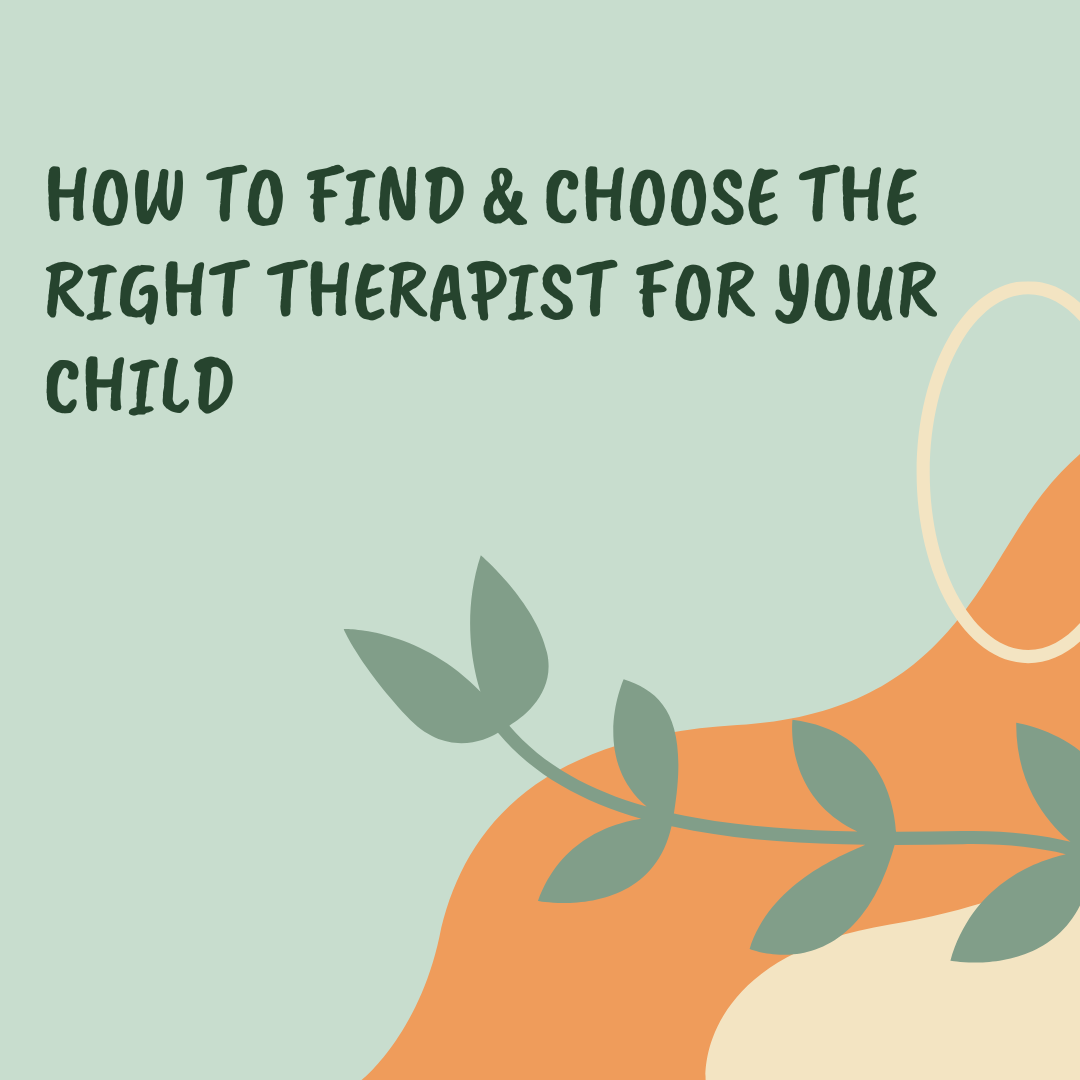
Depression in Children: Signs, Symptoms, & Treatments If you or someone you know is concerned about symptoms related to depression, seeking professional help from a mental health provider is highly recommended. Licensed professional counselors, social workers, psychologists, or psychiatric medication prescribers are able to determine whether a person is experiencing depression and the best methods of treatment.